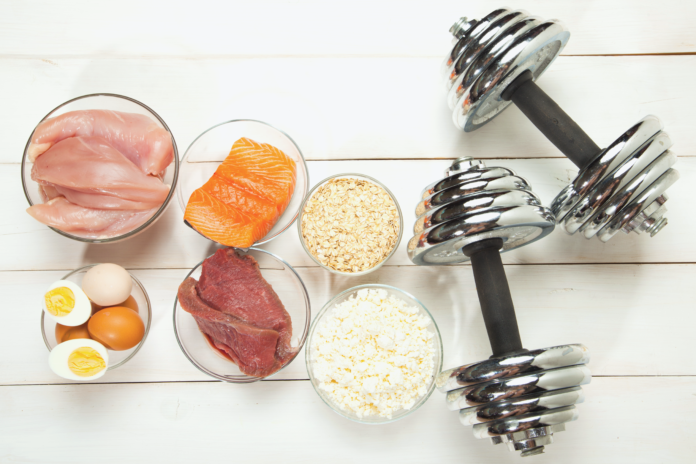Many people have heard of the dirty dozen and clean fifteen as it pertains to food, but how about dirty versus clean bulking? Indeed, dirty bulking is a real concept that is quite controversial among the ether. Wondering how a dirty bulk differs from its clean counterpart?
Read on to discover the benefits and risks of dirty bulking and everything in between!
What Is Dirty Bulking?
Clean bulking, also known simply as bulking, refers to an intentional phase or cycle of eating a caloric surplus (bigger portions) while following a strength training program that initiates muscle hypertrophy.
In other words, bulking involves eating more calories than one burns to gain weight in the form of muscle and/or fat. Many bodybuilders utilize bulking cycles to manipulate their physique, and general athletes may try bulking to make strength gains in the gym.
Dirty bulking is essentially a form of bulking where the nutritional quality of the caloric surplus is not considered. Any and all foods are game and even encouraged with the purpose of gaining weight, no matter how healthy or unhealthy they may be.
Just like clean bulking, though, the dirty version is combined with an intense strength training program, and similarly, bodybuilders, weightlifters, powerlifters, and the average athlete may apply this technique.
Pros and Cons of Dirty Bulking
While dirty bulking can undoubtedly cause weight gain, is it really an effective long-term strategy? Take a clean look at some of the pros and cons to decide for yourself!
Pros
1. Easier to eat in a calorie surplus.
Compared to clean bulking, it is much easier for one to eat more calories than they burn when nutrient density is moot. Many people actually have trouble eating a surplus of calories via foods normally considered healthy (think: fruits, veggies, whole grains, lean proteins, healthy fats) because they contain more fiber and are thus, more voluminous.
Conversely, typical junk food is void of fiber and much easier to overconsume. In the context of a dirty bulk, this is helpful, whereas it would be the complete opposite for someone trying to lose weight.
2. Can promote muscle size and strength gains.
According to the present research, an additional 10-20 percent of normal caloric intake is required to build substantial muscle along with a rigorous resistance training program. Toning muscle, which the majority of people at a conventional gym are accomplishing, is a much easier feat that does not necessitate a specific amount of calories.
However, building actual muscle size is a true fruit of labor that requires time, dedication, a proper training plan, and a steep caloric surplus.
3. May promote a better relationship to food over time.
Ironically, liberalizing one’s diet, as dirty bulking certainly achieves, can actually lead to a better relationship to food and body over time. Those who take bodybuilding or manipulating their physique very seriously often develop a poor relationship with food for a variety of reasons.
However, utilizing a method like dirty bulking can help them reintroduce previously forbidden foods. It can show them the true power of food choices and/or calories when it comes to gaining muscle mass.
Cons
1. Can lead to undesirable fat gain.
No matter the effort and precision or lack thereof guarantees exactly where one gains weight. While proper and quite vigorous resistance training ensures some muscle gain, genetics play a larger role. Some people simply gain and lose body fat and/or muscle easier than others.
Thus, someone who gains fat easily would most likely gain more fat in relation to muscle on a dirty bulk. Furthermore, gaining too much fat, especially in a short amount of time (less than six months or so), incurs various negative health consequences.
2. May affect blood values.
Ever heard of the phrase “skinny fat?” This refers to someone who appears thin from the outside but is not necessarily metabolically healthy on the inside. These folks tend to eat whatever and whenever they desire and do not gain much weight if any, but also exhibit poor blood values like glucose, triglycerides, cholesterol, or even blood pressure.
Interestingly, many professionals consider an overweight person with healthy blood values healthier than someone who appears thin but has poor blood values. In short, this concept is a testament to the functional impact of nutrition beyond energy or weight.
3. Worse nutrient stores.
Similarly, dirty bulking can also lead to micronutrient deficiencies, despite the surplus of macronutrients. Another concept referred to as “empty calories” comes into play here. Conventional junk food typically contains an abundance of macronutrients (carb, fat, and protein) but lacks micronutrients (vitamins, minerals, and phytochemicals).
Since dirty bulks generally promote empty calorie foods, it is plausible that it could lead to micronutrient deficiencies of the vitamins and minerals that are only found in conventionally healthy foods like vitamin C, D, E and K, choline, biotin, and zinc.
4. Depleted energy levels.
Continuing to build upon the last two points, processed and packaged empty-calorie foods usually contain large amounts of refined sugar and sodium that promote water retention and sluggish cells. They generally also include inflammatory fats such as trans and processed vegetable oils which also slow metabolism at the cellular level. This could cause a real problem in terms of training because one needs to exercise pretty intensely to build impactful muscle.
5. Could promote a worse relationship to food.
Although some people improve their relationship to food by liberalizing their diet, others end up tarnishing their view of food and how it affects health beyond weight and/or muscle gain. This is most likely to happen to someone with a history of binge eating, bulimia, or any other eating disorder or those who do not gain much fat by eating whatever they want no matter the nutritional consideration.
Moreover, empty-calorie foods tend to be more addictive to the brain due to the pleasure reinforcement pathway they activate. Thus, someone could become accustomed to only craving these foods, displacing the more nutritious ones and ultimately impact their internal health.
Generally speaking, there are more cons to dirty bulking than bulking via nutrient-dense foods. While it is certainly more difficult to achieve a substantial caloric surplus by only eating healthy foods, metabolism and internal health remain much more vibrant. Perhaps, a meet-in-the-middle approach works best?
Foods to Eat During a Dirty Bulk
Generally speaking, dirty bulks mostly include calorically dense and high-protein foods. A high percentage of calories may also come from fat as these foods are more concentrated, thus easier to overeat than something like broccoli.
Foods that Promote Muscle Growth
- High protein foods (red meat, poultry, fish, Greek yogurt and tofu)
- Protein powders
- Protein Bars
- Eggs and egg whites
- Starches (potatoes and grains– bread, pasta, rice, quinoa, oats)
Foods that Promote Weight Gain (Muscle and Fat)
- High calorie mass gain powders
- Cereal and cereal bars (granola and bars)
- Fast food
- Junk food/refined carbohydrates (cookies, crackers, chips, ice cream, etc.)
- Cured meats (pepperoni, salami, sausage and bacon)
- Fats (butter, cheese, refined oils, mayonnaise, salad dressings, etc.)
Nutrient-Dense Foods to Include For Health
- Fruits and vegetables
- Starchy vegetables (potatoes, winter squashes, peas, beans and legumes)
- Healthy fats (avocado, olive oil, coconut and foods high omega-3 fatty acids)
- Nuts, nut butters and seeds
Foods to Avoid
- Low-calorie or diet versions of foods (i.e. low-fat crackers, crystal light, whipped yogurt)
- Sugar-free foods
- Artificial, no-calorie sweeteners and condiments
- Diet soda
- Low-calorie, high water-content foods (watermelon, iceberg lettuce, celery)
The Bottom Line
Dirty bulking is a term that refers to combining a resistance workout program with a caloric surplus diet that promotes eating anything and everything without regard for nutrition. While anyone can utilize this method, it tends to work best for those who need to consume a very amount of calories or those who want more liberalization in their diet.
Even if it is a short-term effective strategy, it should not be followed long-term because of the negative health implications of consuming a nutritionally void diet. Clean or conventional bulking is an alternative to dirty bulking that still promotes muscle growth and strength while also considering the nutritional value of food. The dirty truth is that eating clean most of the time is simply best for overall health.
References:
Tommy. Dirty Bulking – The SECRET To Getting Big. Vekhayn. vekhayn.com/dirty-bulking/.
Walle GV. Bodybuilding Meal Plan: What to Eat, What to Avoid. Healthline. Written November 19, 2018. www.healthline.com/nutrition/bodybuilding-meal-plan.









